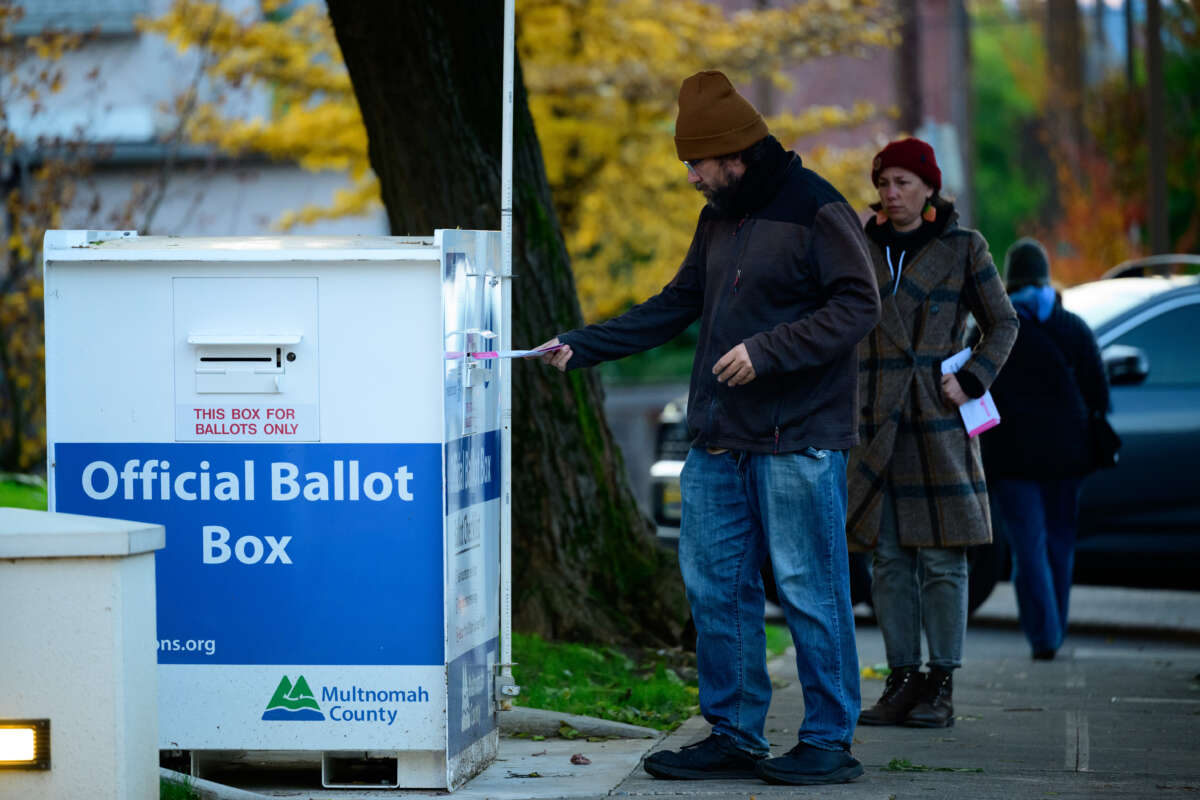Honest, paywall-free news is rare. Please support our boldly independent journalism with a donation of any size.
Next fall, Oregon residents will vote on whether to implement ranked-choice voting in statewide races.
Democratic lawmakers in the state legislature passed House Bill 2004 on Sunday. The bill will pose the question of ranked-choice voting to voters themselves, asking on the November 2024 ballot whether the system should be adopted for use in a number of federal and state elections — including elections for president, the U.S. Senate and House of Representatives, and gubernatorial and statewide posts.
The bill requires the state Secretary of State’s office to devise a means of educating voters on how the process works. It also gives local governments, such as counties and cities, the ability to incorporate ranked-choice voting in their own elections, and provides state resources for them to do so.
If voters agree to pass the measure, the use of ranked-choice voting would begin on January 1, 2028.
Ranked-choice voting is already used in some parts of Oregon, including in the city of Corvallis and in Benton County. Starting in 2024, it will also be used in Portland mayoral and city council elections.
Elsewhere in the U.S., this system of voting is used in statewide races in both Maine and Alaska. Nevada voters are set to decide on whether to implement statewide ranked-choice voting, too, in 2024. Currently, more than 50 cities across the U.S. use ranked-choice voting.
Under a ranked-choice voting system, a candidate must attain a majority of ballots in order to win office. If no candidate wins a majority in the first round, the candidate with the fewest votes is removed, and the second choices of voters who preferred that person are tallied to the candidates who remain. The process continues until one candidate receives a majority vote.
Ranked-choice voting ensures that voters can vote their consciences instead of requiring them to use strategy to decide whether they’d be “throwing a vote away” by supporting so-called “spoiler” candidates that they actually prefer. The system is also beneficial for third-party candidates, who can enter political races without being viewed negatively and win elections if they appeal to enough voters.
The voting system also makes it less likely for candidates with extremist views to win primary elections, much less general election races, as voters won’t be forced to decide between what they may see as the best of two bad choices.
Critics of ranked-choice voting claim that it is confusing for voters — but real-world examples of it being used in other parts of the U.S. show that these claims are unfounded, as voters, by wide margins, say they are not confused by the process.
Ranked-choice voting is regularly opposed by Republicans, but some Democrats also oppose it, likely viewing it as problematic for them in some Democratic-controlled areas because it could allow more progressive candidates to win elections.
Supporters of ranked-choice voting in Oregon lauded the vote granting voters the right to decide whether to implement the system in the future.
Ranked choice voting “will help ensure voters feel like they are represented by leaders who actually reflect their values, [without] having to worry about [spoiler candidates]. It’s about restoring people’s faith in our democracy,” said state Rep. Khanh Pham, a Democratic lawmaker for southeast Portland and nearby areas.
“We are overjoyed that our state lawmakers passed HB 2004 to provide the opportunity for Oregonians to make a meaningful choice about the future of their democracy,” said Sol Mora, who served as the HB 2004 Coalition Leader, and who currently serves as director at the Coalition of Communities of Color, a nonprofit based in Portland.
She added:
We know that Oregon voters are frustrated. Ranked choice voting is a simple improvement that will help focus campaigns on the issues and give voters more options to elect their true favorites. Candidates will also benefit from ranked choice voting by being able to run without fear of splitting the vote, which will help more youth, people of color, working-class people, and candidates from rural communities get elected.
Media that fights fascism
Truthout is funded almost entirely by readers — that’s why we can speak truth to power and cut against the mainstream narrative. But independent journalists at Truthout face mounting political repression under Trump.
We rely on your support to survive McCarthyist censorship. Please make a tax-deductible one-time or monthly donation.
